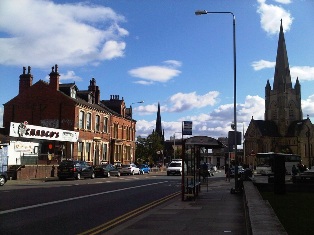10.09.30
To build or not to build? Kyoto's aquarium
カテゴリ:雑記
There's an aquarium coming to Kyoto.
Well there was until work was halted recently over archaeological findings at the dig-site.
This is good news for a group of protestors who want the project abandoned.
The aquarium is, or was, under construction in Umekoji public park just west of Kyoto station.
Chief amongst the protestors' complaints is that building on a public space will result
in less green space.
"City parks are essential for people's physical and mental well-being,"
the group state in their petition to stop the park.
Kyoto is a compact city and while the green covered hills that hug the outskirts are visible
from all points of the city, there is not much in the way of green open spaces in Kyoto.
But then again, this is true of most Japanese cities.
Secondly the protestors claim that an aquarium is not suitable for Kyoto's economy
becasue Kyoto has no maritime connections,
While this is true what relevance does it really have for not building an aquarium?
You could say the same about every city that has a zoo.
Where I am from in Cork, Ireland we have a wildlife park with giraffe.
Giraffe are not native to Ireland.
But the wildpark that was built, I would guess, to entertain and make money.
So too with the Kyoto aquarium.
Kyoto is a major tourist destination. While western tourists might be drawn to
Kyoto's abundance of ancient temples, tourist and business officials are of the opinion
that Asian tourists, particularly the burgeoning Chinese tourist eager to spend yen,
are just as eager to see Flipper and giant crabs.
What do you think? Should the aquarium be built?
◆Glossary◆
petition
(noun)
a formal request to people in power for mercy or a favour or some other benefit
(verb)
to beg or to request something
maritime (adjective)
connected to the sea, related to the sea
burgeoning (from the verb to burgeon)
to grow or flourish
abundance (noun)
extremely plentiful, many, a lot
投稿者:エイセット
10.09.25
◆ 地球的旅行記3 ◆ イギリス・リーズ編 3
カテゴリ:◆ 地球的旅行記 ◆
今回はリーズの街並み、シティーセンターと大学付近の写真を紹介します。


この3枚は、私が徒歩で学校へ行く時に見える景色です。
1番上は、寮の近くの住宅街で、とても静かです。
2枚目は途中にある大きな公園の向かいに見えるリーズの住宅地。
少し学校からは離れている寮は大体この住宅地にあります。
3枚目は、イギリスらしいかと思って撮りました。
この周りにはパブとか、カフェなどの食べ物屋さんがあります。
これがシティーセンターです。
Main road からは少し外れているので、あまり賑やかではないですけど、
もう少し先へ行けば賑やかで、アーケードもあって買い物にはうってつけの場所です。
今度、またシティーセンターへ行った時に Main road の写真も撮りたいと思います。
次回は、大学内、大学の施設や私の寮について書く予定です。
もし何か知りたい事や、気になる事があればコメントして下さい。
出来る限り返信しようとおもいます。
Hope you all like my first post on my life in Leeds!! :)
投稿者:エイセット
10.09.24
◆ 地球的旅行記3 ◆ イギリス・リーズ編 2
カテゴリ:◆ 地球的旅行記 ◆
イギリス・リーズに留学されている方からの現地情報第2弾です。
--------------------------------------
そして、私がこれから約1年間暮らす街リーズ、というと、
いつも「どの辺り?」と聞かれますが、
イングランドの上の方で、首都ロンドンまでは列車で2時間くらいかかります。
リーズか、、、あまり聞いた事がないから田舎なのかな?と思ったら大間違い!
大学から歩いて10分、15分で着くシティーセンターには色んなお店があって
週末となれば人でごった返しています。
Main road には H&M, Primark, American Apparel, Topshop, Zara, GAP, 無印, Marks & Spencerや
他にも高級ブランドのお店や、お手頃価格のお店など、色々なお店があって、殆どなんでも揃います。
アジアンマーケットがあるので日本米も、キュ- ● - マヨネーズだって手に入ります。
他のお店はどうだったか忘れましたが、Topshopは学生なら10%,20% OFFになるという、
大学街らしいサービスも充実しています。
私はこの前、こっちに来て初めてシティーセンターで買い物をしましたが
H&Mで買えば、洋服は10,000円でかなり揃えられます。
もしイギリスに旅行に来る事があれば、リーズの街を訪れてみても損はないと思います。
これは、大学のメインキャンパスの近くにあるバス停からの景色です。
この日はめずらしく快晴でした。
右に見える方に進めば、リーズ大学があります。
大学はこのメインキャンパスの付近にたくさんの建物を所有していて、
スーパーにTESCOの隣に International Student Office があったり、
お店を挟んでれ区シャーの行われる教室があったりと、
ここ一帯はリーズの大学の学生の為の場所といった感じです。
ここから少し真っすぐ進んで、シティーセンターに方へ向かえばリーズメトロポリタン大学があります。
次回はシティーセンターと大学付近の写真を紹介します。
イギリス・リーズ編3に続く・・・
投稿者:エイセット
10.09.21
◆ 地球的旅行記3 ◆ イギリス・リーズ編 1
カテゴリ:◆ 地球的旅行記 ◆
地球的旅行記第3弾はイギリスのリーズから。
いつもは旅行から日本に帰って来られてから、
写真をいただき文章を書いてもらっているのですが、
今回の地球的旅行記は、現在イギリスに留学されて
いる大学生の方からのライブ・ブログポストです。
これから留学を考えておられる方は是非ご覧ください。
--------------------------------------------------------------------
どうも、こんにちは。
今月14日から、イギリスは北部、West Yorkshire にある Leeds という街で
1年間交換留学をしている大学生です。
細かくは忘れましたが、a.set には約1年間お世話になりました。
このブログでは、イギリスでの私の大学生活や、私が体験したサブカルなどについて
時々書かせてもらおうと思います。
私の留学先であるリーズ大学は、1904年に設立された国立大学で、規模がとても大きいので
留学生の数もとても多いです。
とにかく様々な人種の人たちがいるので、差別的な言動にはあまり出くわさないのですが、
学校は International Students のためのオリエンテーションで、
人種差別的な発言をされた場合や、異文化から来たという理由だけで不快な思いを
させられた場合は、学校に報告をすれば、警察に届けます、と説明していて、
国際色豊かな大学ならではの力の入れ具合だと思います。
もちろん、どの国にも同じ様にふざけた若者は結構いて、それが学生街なら尚更です。
いきがった pack boys (集団で行動する男の子たち)が日本人特有の幼い見た目を
からかってきたりする事はあります。
そこは若いからって事で見逃してあげれば、あとは特に気になる事はありません。
イギリス・リーズ編2に続く・・・
投稿者:エイセット
10.09.18
Katakana English
カテゴリ:雑記
I was in MacDonalds recently drinking a シェイク when I noticed an advert for part-time work.
It simply said マック de バイト and it got me thinking, not about working there, but katakana English.
When you study Japanese you end up relearning English. What do I mean?
Well consider the thousands of loan words, many from English,
which have crossed over in to Japanese : トイレ インターネット ツイタ- the list goes on and on.
If I say these words, as they are pronounced in English, to a Japanese person they normally
look at me like I am speaking Turkish.
To be understand you have to speak kanakana English.
The striking difference between English and Japanese is that in English loan words are
rarely changed from the language they are adopted either for spelling or pronounciation.
For example, here are a few Japanese words used in the English lexicon:
sushi, tsunami, sumo, geisha, kimono and hari kiri.
Generally these words are pronounced in English as they are in Japanese.
In theory they are anyway, of course accents often get in the way of pronounciation.
One of my brothers pronounces hari kiri, harry karry,
But in Japanese the adopted word is changed so instead of toilet we get "toire".
This is chiefly because of the absence of the 'l' sound in Japanese.
So even though toilet and toire are a place to pee, the pronounciation is as different as
the shape of Japanese toilets is to Western-style toilets.
To return to MacDonalds. After seeing the job advert I started thinking what if Japanese
ditched katakana and replaced it the English alphabet?
The alphabet is widely udes in Japan; with only 26 letters it's quick and easy
to learn and if loan words from English were kept in their original script it might
eventually lead to new sounds being introduced to the Japanese language.
Shoud English replace katakana? What do you think?
◆Glossary◆
lexicon (noun)
the vocabulary of a language
striking (adjective)
noticeable, conspicuos
投稿者:エイセット
10.09.14
Fashionable Japanese English
カテゴリ:雑記
English is everywhere.
It's the linga franca of diplomacy, business, sport, the internet, pop music,
possibly even stamp collection.
I imagine even on the moon or Mars they have signs in English reminding you to
"Switch off you mobile" and "No smoking."
Earlier this summer Uniqlo and Rakuten made headlines with their representive policies
to make English their official languange. While Uniqlo, the cheap clothing chain, has sotres in English speaking countries, what is surprising is that both companies aim to make English the official language even in their Japanese offices.
Living in Japan I am surprised by the ubiquity of English; it's on restaurant menus, napkins, sign posts, pachinko parlours, timetables and T-shirts.
While often it's not perfect and does elict some smugness from native English speakers,
every word, no matter its spelling, helps massively if you have no clue of Japanese.
One of the enjoyable side effects of my never ending commute in Japan is people watching, or T-shirts watching, specifically ovserving the English emblazoned on T-shirts.
From my observation of the English used on T-shirts I have come to the conclusion that Japanese fashion designers have a love affair with the following words: "Enjoy" "Happy" "Happy time" "dream""love" "let's".
When it comes to deciding what words to put on a T-shirt, grammer rules are generally something best avoided, thus allowing for slogans like; "Please let's enjoy Happy Love Time Dreams."
Something I have pondered often is the love of the word "enjoy" in Japan.
From conversing with Japanese English speakers I notice that the verb "enjoy" is commonly employed. For example; "In Kyoto we can enjoy seeing many temples and eating delicious food."
Technically this statement is grammatically correct but it sounds non-native and more likely a Google translation taken from a guidebook.
Native English speakers are more likely to say something like "There are lots of temples to be seen in Kyoto"
Some of the most memorable T-shirts I have chanced upon are closer to philosophical meanderings than fashion slogans. Please see the picture below, and please enjoy it too.
Some other slogans that I have seen on my train rides include a plain white T-shirt with orange letters stating, "My favourite coulour is Orange". In Kyoto station I spotted an Asian tourist wearing the following T-shirt; "Let's enjoy throbbing at the moment"
◆Glossary◆
ubiquity (noun)
present, appearing or founf everywhere
linga franca (noun)
a language that is adopted as a common language between speakers whose native language is different
emblazon (verb)
iscribe or display, usually on clothes
slogan (noun)
a short memorable phrase used in advertising
meandering (adjective)
proceed aimlessly or purpose

投稿者:エイセット
10.09.08
2010年9月 (イギリス大学院・学生ビザ・家族の分も)
カテゴリ:生徒様の声
◆2010年9月 (イギリス大学院・学生ビザ・家族の分も)
今年の秋からイギリスの大学院に行く予定です。
日本の会社に勤めています。会社から1年間専門的な分野を学べる時間をもらう事が出来ました。
せっかくの機会なので是非チャンスを活かして多くの事を学んでこようと思っています。
長期間滞在するので家族を連れて行こうと考えています。
大学院の手続きは自分自身でなんとか進めてきましたが、ビザに関してはややこしくて困っていました。
まして家族の分もとなると自分一人ではどうにもならなかったので、エイセットにお願いしました。
きちんと話を聞いてくださり、何を準備したらよいかを丁寧に説明してくれました。
出発までたくさんやる事がある中で、ビザ書類に関しては安心してお願いする事が出来、
現地の情報も教えてもらえたので満足しています。
投稿者:エイセット
10.09.06
秋の気配は・・・
カテゴリ:雑記
9月に入っても暑い日が続いています。
昨日京都の南部、京田辺市では
9月では観測史上最高となる、39.9℃を観測しました。
毎日のように熱中症で病院に運ばれる人のニュースを耳にします。
室内にいても熱中症にかかるひとが多いそうです。
また、今年の夏は雨がすくない気がします。
夕立もほとんど降っていません。
にもかかわらず、水不足のニュースをまったく聞かないですが、
この先水不足の心配はないのでしょうか。
すこし秋らしいものを。
生徒の方の田舎でぶどうを作っておられるそうで、
それを頂きました。
冷やして食べるとおいしかったです。
もう少しで、涼しい秋が来ます・・・
と願いましょう。

投稿者:エイセット
![]()
- To build or not to build? Kyoto's aquarium(09/30)
- ◆ 地球的旅行記3 ◆ イギリス・リーズ編 3(09/25)
- ◆ 地球的旅行記3 ◆ イギリス・リーズ編 2(09/24)
- ◆ 地球的旅行記3 ◆ イギリス・リーズ編 1(09/21)
- Katakana English(09/18)
![]()
- + 講師紹介 +(1)
- ◆ リンク(1)
- ◆ 地球的旅行記 ◆(19)
- お知らせ・告知(61)
- アメリカ留学情報 (学生ビザ・学校紹介)(12)
- イギリス留学情報 (学生ビザ・YMS・学校紹介)(102)
- オーストラリア留学情報 (学生ビザ・ワーキングホリデー・学校紹介)(15)
- カナダ留学情報 (学生ビザ・ワーキングホリデー・学校紹介)(27)
- ニュージーランド留学情報 (学生ビザ・ワーキングホリデー・学校紹介)(27)
- 生徒様の声(18)
- 自宅での英語学習(196)
- 英語を続ける(7)
- 雑記(478)
- CYセミナー(21)
![]()
- 2024年1月(3)
- 2023年12月(4)
- 2023年11月(3)
- 2023年10月(5)
- 2023年9月(4)
- 2023年8月(5)
- 2023年7月(4)
- 2023年6月(4)
- 2023年5月(4)
- 2023年4月(5)
- 2023年3月(4)
- 2023年2月(4)
- 2023年1月(5)
- 2022年12月(5)
- 2022年11月(4)
- 2022年10月(5)
- 2022年9月(4)
- 2022年8月(3)
- 2022年7月(3)
- 2022年6月(2)
- 2022年5月(2)
- 2022年4月(6)
- 2022年3月(3)
- 2022年2月(5)
- 2022年1月(9)
- 2021年12月(4)
- 2021年11月(5)
- 2021年10月(6)
- 2021年9月(3)
- 2021年8月(7)
- 2021年7月(2)
- 2021年6月(6)
- 2021年5月(5)
- 2021年4月(2)
- 2021年3月(4)
- 2021年2月(3)
- 2021年1月(6)
- 2020年12月(2)
- 2020年11月(2)
- 2020年10月(3)
- 2020年9月(1)
- 2020年8月(3)
- 2020年7月(6)
- 2020年6月(5)
- 2020年5月(3)
- 2020年4月(4)
- 2020年3月(2)
- 2020年2月(3)
- 2019年11月(1)
- 2019年10月(1)
- 2019年9月(1)
- 2019年7月(1)
- 2019年6月(1)
- 2019年5月(1)
- 2019年4月(1)
- 2019年3月(2)
- 2019年2月(2)
- 2019年1月(3)
- 2018年12月(3)
- 2018年11月(1)
- 2018年9月(1)
- 2018年8月(2)
- 2018年6月(3)
- 2018年5月(2)
- 2018年4月(2)
- 2018年3月(1)
- 2017年12月(1)
- 2017年11月(3)
- 2017年9月(2)
- 2017年8月(2)
- 2017年7月(3)
- 2017年6月(4)
- 2017年5月(3)
- 2017年4月(2)
- 2017年2月(2)
- 2016年12月(2)
- 2016年11月(1)
- 2016年10月(2)
- 2016年9月(2)
- 2016年8月(1)
- 2016年7月(2)
- 2016年6月(1)
- 2016年5月(1)
- 2016年4月(3)
- 2016年3月(4)
- 2016年2月(6)
- 2016年1月(2)
- 2015年12月(4)
- 2015年11月(2)
- 2015年10月(3)
- 2015年9月(3)
- 2015年8月(2)
- 2015年7月(4)
- 2015年6月(3)
- 2015年5月(3)
- 2015年4月(4)
- 2015年3月(5)
- 2015年2月(2)
- 2015年1月(5)
- 2014年12月(5)
- 2014年11月(4)
- 2014年10月(8)
- 2014年9月(14)
- 2014年8月(12)
- 2014年7月(19)
- 2014年6月(12)
- 2014年5月(12)
- 2014年4月(12)
- 2014年3月(14)
- 2014年2月(12)
- 2014年1月(12)
- 2013年12月(12)
- 2013年11月(11)
- 2013年10月(16)
- 2013年9月(15)
- 2013年8月(21)
- 2013年7月(17)
- 2013年6月(4)
- 2013年5月(4)
- 2013年4月(7)
- 2013年3月(4)
- 2013年2月(1)
- 2013年1月(4)
- 2012年12月(3)
- 2012年11月(2)
- 2012年10月(5)
- 2012年8月(2)
- 2012年7月(1)
- 2012年6月(3)
- 2012年5月(2)
- 2012年4月(2)
- 2012年3月(1)
- 2012年2月(1)
- 2012年1月(2)
- 2011年12月(2)
- 2011年11月(4)
- 2011年10月(4)
- 2011年9月(2)
- 2011年8月(4)
- 2011年7月(2)
- 2011年6月(4)
- 2011年5月(3)
- 2011年4月(5)
- 2011年3月(3)
- 2011年2月(4)
- 2011年1月(7)
- 2010年12月(7)
- 2010年11月(6)
- 2010年10月(6)
- 2010年9月(8)
- 2010年8月(7)
- 2010年7月(4)
- 2010年6月(10)
- 2010年5月(28)
- 2010年4月(28)
- 2010年3月(30)
- 2010年2月(27)
- 2010年1月(28)
- 2009年12月(27)
- 2009年11月(25)
- 2009年10月(26)
- 2009年9月(23)
- 2009年8月(21)
- 2009年7月(19)
- 2009年6月(9)
- 2009年5月(10)
- 2009年4月(8)













